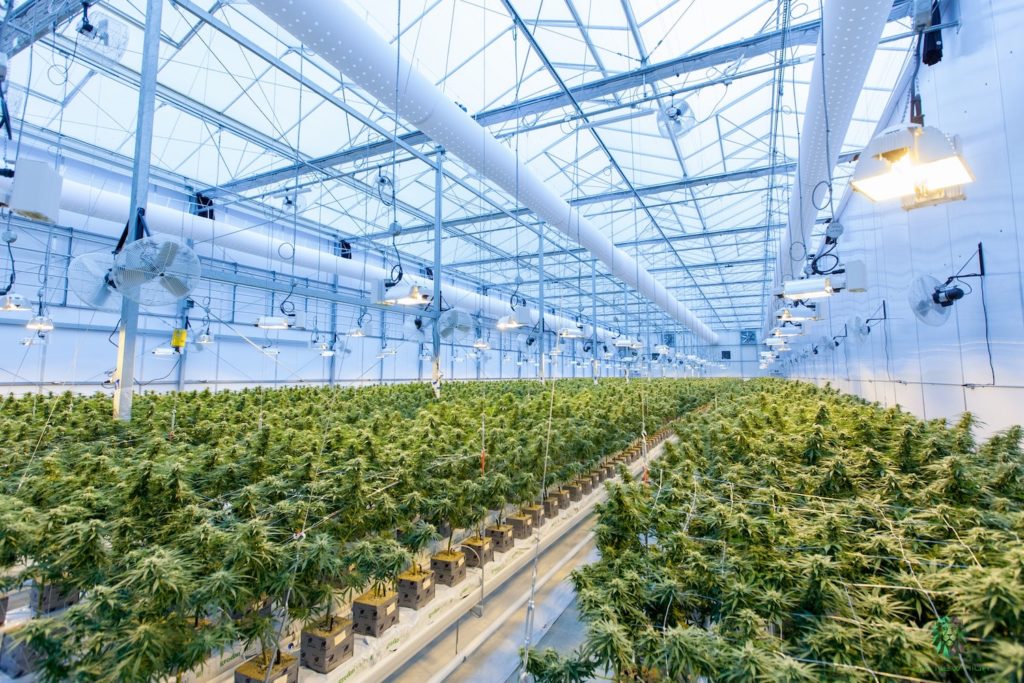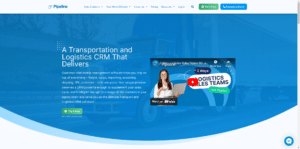Increase Sales for Your Cannabis Business
Back in February, Pipeline CRM took part in the CannaCon Seattle convention which was held at the Washington State Convention Center.
CannaCon is one of the world’s largest cannabis industry expo events where entrepreneurs are braving the unknowns of a new industry—and aim to grow their businesses exponentially. After all, the potential is there. Being sales software experts, we know that goal is possible with the right CRM software.
We were happy to sit down with Nick Smart, General Manager of CannaCon and Co-Host of the CannaCon Radio Podcast and talk about all things sales.
We’ve transcribed the interview with Nick Smart and summarized the big takeaways at the end of the post.
Software to Increase Profits: Sales CRM
Nick Smart, General Manager of CannaCon and Co-Host of CannaCon Radio: What’s up guys, CannaCon Radio. It’s Nick, flying solo today, without John, but I’m here with another John. I got John from Pipeline Deals. What’s up, John?
Jon Englund, Senior Account Executive at Pipeline CRM: Hey, how you doing today?
Nick: That was a lot of Johns, Jesus Christ.
Jon: That was a lot of Johns.
Nick: I’m doing great, how are you doing?
Jon: I’m doing good, CannaCon’s been amazing.
Nick: You said you’ve been busy, which is pretty cool.
Jon: It’s fun walking around and meeting all the different technologies that are coming out, and labs that are out there, products and manufacturing. So, It’s been a lot of fun.
Nick: So you know, plug your company. What are you guys all about?
Pipeline CRM Sales CRM for the Cannabis Industry
Jon: Pipeline CRM is a sales CRM, so we help canvas companies with their sales processes.
Nick: Okay.
Jon: How do you nurture leads that are coming in, how do you handle the post sales side of things, how do you get recurring revenue, how do you know when your retail store needs to order more.
We handle a lot of farm business, producer-processors, wholesalers and distributors who want to track their revenue growth. BDS Analytics came out and said it’s a 9 billion dollar industry last year, and they expected to grow to 47 billion.
How do you do that with Excel sheets and pen and paper? You need a software in place to track those APIs, and what’s your sales cycle, and you know.
Nick: You know, It’s really funny that he mentions that, because for the first three or four years of CannaCon, we used Google Sheets. It was a nightmare because we literally color coded things and it was a live Google Sheets, with four different salespeople. So when you were typing something in and someone hit enter, your stuff went away. Now we pay 15,000 dollars a year to use Salesforce, but as a small company, we couldn’t afford 15,000 dollars a year for Salesforce.
Jon: Right, it didn’t make sense.
Nick: But now it’s probably made my company a hundred thousand dollars a year. You’d be amazed at how many 30 seconds quicker phone calls equate to. I can make five more phone calls in a day. Well, five more phone calls in a day are 25 more phone calls in a week, when you’ve got three guys calling, that’s 75 more phone calls in a week, that’s probably five more sales.
Sales CRM Workflow Templates for Productivity
Jon: It [Pipeline CRM] creates those workflow templates and automations too, so that you know when you need to follow up. You know your business, but it gives you a higher level of insight into when you need to reach out to someone. As these smaller businesses grow and they’re dealing with only 3 retail shops right now but they want to grow to 50. And you get 50 new business cards, it’s hard to remember to call everyone, and deals slip through the cracks. You know, someone says, “Call me next week” and if you don’t have a software in place like Pipeline CRM, they’re going to disappear. You’re going to forget about it. You need software like Pipeline CRM to help you automate those processes so you don’t lose deals, and you don’t let things slip through the cracks.
Nick: It’s funny you mention that. My dad and I were having a conversation the other day, and he said, “I find it hard to believe that when a vendor says, ‘We’ve gotten 300, 400 awesome leads from your show.’ and then you call them nine months later and they say, ‘Well yeah, none of those turned into anything.’” You really start to think of, did you really have the infrastructure to deal with the leads that you were ready to receive? And I think the conclusion that we’ve come to is that they’re not ready for that.
Jon: No, they’re not.
Nick: And what you’re saying is that’s where you come into play.
Jon: That’s where we come into play at Pipeline CRM. I talked specifically to a guy that came by the booth and he’s like, “I’ve gotten over 200 business cards while I’ve been here.” The first follow-up is easy, because it’s just a business card. What are you doing after that? You need a software in place like Pipeline CRM to input their information and create follow up tasks. Move them through deal stages, from initial contact, to negotiating an arrangement with them, to selling to them, and then reorders.
And how do you, on top of that, if you have a new SKU item, you have new products coming out, how do you inform those people about that? Are you going to call every single one, or do you use a product like Pipeline CRM where we allow you to campaign market? You can segment your group of say, retail stores into different regions and stuff, and tag all them and send the campaign email, “I have these 3 new SKUs, are you guys interested in that?” Are you going to pick up the phone and call every single person and try to do that, or would you rather do it with a click of a button?
Sales CRM Cost and Support
Nick: So I know when we switched over, it was going to be like 24,000 dollars to integrate all of our data into Salesforce. So instead we literally paid 500 bucks, took a course, and did it ourselves because it wasn’t as daunting as it seems to be. We got 99% of our data transferred. There were a few hiccups, but within a month we got it transferred. Some of these companies you’re going to be talking to have thousands upon thousands of leads. That’s a daunting task to enter in every single business card one by one. So do you help with that at all, or is that a
“that’s on you guys”?
Jon: I think that’s where we differentiate ourselves in the market a lot. We believe you should feel like you have a team behind you. So you have unlimited phone support, unlimited email support, unlimited chat support. We train you upfront at Pipeline CRM to be your admin, and to customize the platform to fit your needs. Then be able to do imports, to be able to change things on the fly.
These companies that we’re talking to, they want to grow, they want to scale at some level. And we teach them to be able to, at Pipeline CRM, scale the platform themselves. So they don’t have to keep paying people to edit the software and stuff like that. So yeah, we’re big believers in these companies feeling like they have a team behind them, that has their best interests in mind, and not have to pay more to do it.
Nick: You know, we actually just switched to a website like that, where instead of me having to call you every time I sell a sponsor and you put their logo on their website, now it’s built to where I can just go and put my logo on the website myself.
Jon: Right, it feels way more efficient that way too. You’re not waiting on someone else to help you.
Efficiency to Stay Competitive
Nick: Oh, it’s way more efficient! Because we can tell you, as a potential client, as a potential sponsor, “I’ll put it on right now!” “You mean I don’t have to wait until Wednesday when your tech guy — oh, you are a tech guy!” It empowers us in a lot of ways, right? But at the end of the day, it makes us more efficient and that’s really the key, is efficiency. At least I feel like to make it in the 502 market specifically in Washington, you have to become much more efficient.
Jon: Yeah, and think about it, even with CannaCon, as a small business that’s starting, you have a vision for what you’re going to do. And what your needs are, and maybe what your process is going to be. Over time, that changes. It changes all the time. It’s the same thing with these small business out here. They have an idea of what they want to do right now, they have a strategy of what they want to go after. Six months from now, that might be wildly different. And your software needs to be able to pivot with you.
Nick: It does, absolutely.
Jon: So we take that approach too. We’re so customizable at Pipeline CRM, we’re not trying to fit you into our box. The system is so customizable that whatever the processes you want for your business, we can tailor the box around you.
Nick: You know, this is really interesting. I know you haven’t got to sit here all day, but if you had sat here all day. I think the thing we keep hearing is, it’s what you want, it’s how you want it. It’s not, “You have to do it this way anymore, this is the way it works and you have to get used to it.” It’s, “We’ll build it to how you need it to be.” And I think that, it seems to me that maybe that’s the wave of the future. Instead of building everyone into a box, is we get to build our own boxes.
Jon: Yeah I mean, I’ve talked to three different vape suppliers. They all process differently. Everyone takes a slightly different approach on how they structure their business, and what their process is for getting new leads. And what their process is selling to a lead, and what their process is to nurture that relationship after the fact.
Nick: Were any of them good?
Jon: They were decent. But we had some good conversations around creating structured processes within your business, because the more processes you have, the easier it is to move quickly, more efficiently.
Nick: Sure, sure. Well y’know, John I really appreciate you coming on. It’s time to go, and I’m sure you want to get back there and talk to some more people. I really appreciate it, again. Thank you very much.
Jon: Thank you so much.
Nick: CannaCon Radio. Peace out guys
Key Sales CRM Takeaways
- A sales CRM is for all types of cannabis businesses including farm business, producer-processors, wholesalers, and distributors who want to track their revenue growth.
- According to BDS Analytics, 2017 cannabis industry sales totaled $9 billion which is equivalent to annual revenue from Pampers diapers or annual revenue from Microsoft’s gaming division.
- Businesses are not tracking goals efficiently with Excel sheets and pen and paper. CRM software is built to track those APIs, keep you in the know about what’s your sales cycle, and grow your sales pipeline.
- CRM software keeps information so you can create follow up tasks. Move your customers through deal stages, from initial contact, to negotiating an arrangement with them, to selling to them, and then reorders.
- In the 502 market, a sales CRM helps businesses become much more efficient.
- Small businesses have an idea of what they want to do and they may have a strategy of what they want to go after. Six months from now, that might be wildly different. Your sales CRM software needs to be able to pivot with you.
- Cannabis businesses want to grow, they want to scale at some level. At Pipeline CRM we can teach them how to scale the platform themselves.
- We had some good conversations here around creating structured processes with a sales CRM within your business. The more processes you have, the easier it is to move quickly and more efficiently.
- A CRM is for all types of cannabis businesses including farm business, producer-processors, wholesalers, and distributors who want to track their revenue growth
Be sure to check out my earlier blog post: How to Increase Cannabis Sales.




